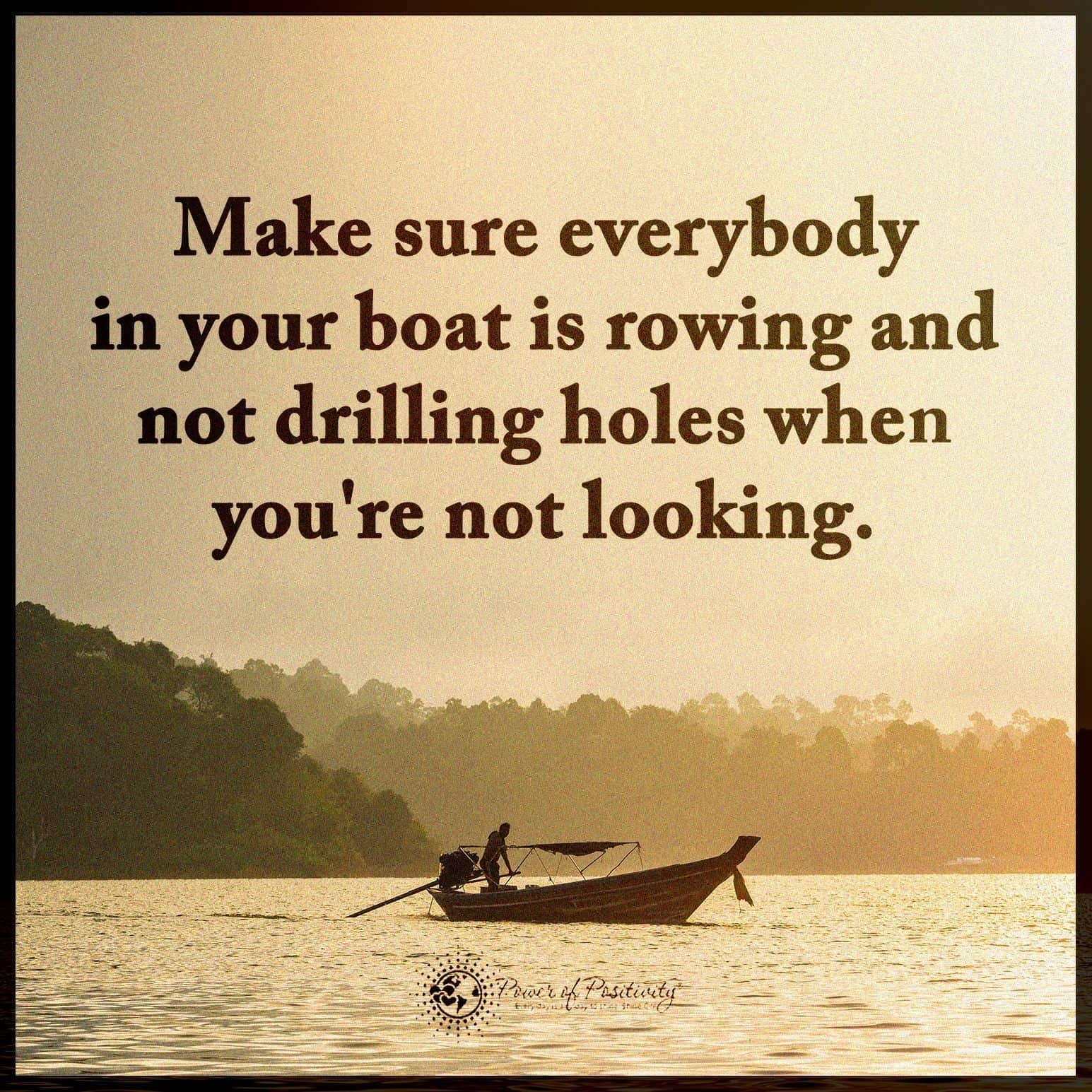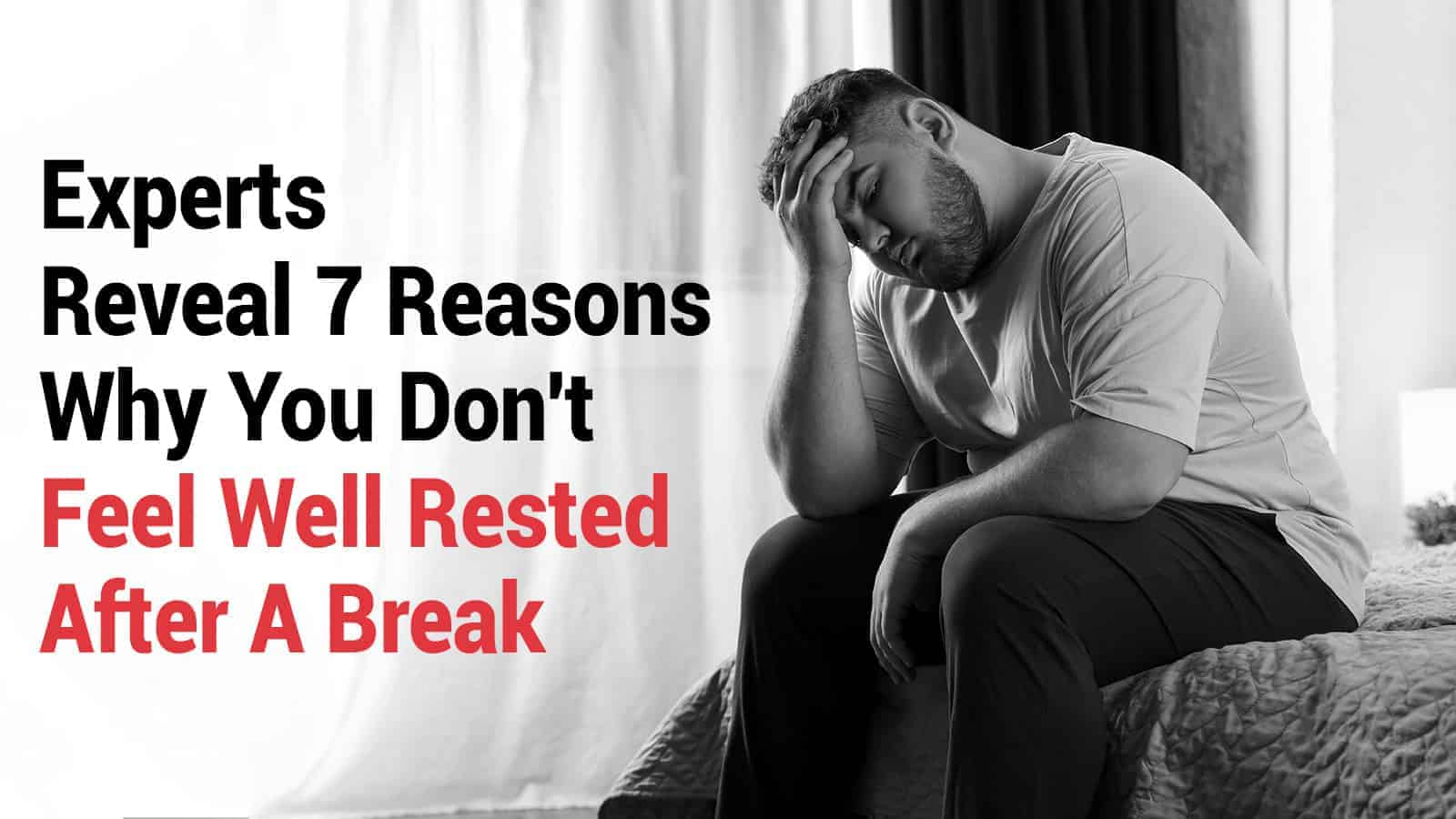If you’re someone who knows how to balance your schedule and time for relaxation, you probably take a decent number of breaks. Whether these breaks involve holidays, me-time, normal nocturnal sleep, or ten-minute intervals away from your desk, you know just how important rest is to your brain and body.
But what if you’re resting enough, but still feeling tired afterward? What do you do when you think you’ve slept well or taken enough of a break but can’t see any positive way it’s impacted you? Here’s how experts reveal seven reasons why you don’t feel rested after a break.
1. You’re Dehydrated
Dehydration is a prevalent cause of tiredness. According to Texas Health Ben Hogan Sports Medicine dietitian Amy Goodson, RD, even as little as 2% fluid loss can affect the amount of energy you have. This is because:
- A lack of hydration leads to reduced volume of the blood
- Reduced volume of blood leads to thicker blood
- Thicker blood causes less efficient pumping from the heart
- Less efficient pumping of the heart means nutrients and oxygen take longer to travel through the body
Studies point out that dehydration can significantly affect professional sportsmen, impairing their performance and causing increased exhaustion during intense play. It’s also a known fact that dehydration can negatively impact mood and cognitive performance, leading to reduced focus, positive thinking, and efficiency.
Not sure how much water you should be drinking in a day? The consensus is eight glasses or 2 liters, but you can also calculate it, especially for you. Divide your weight in pounds in half and drink that many ounces of water daily.
2. You Have Uncomfortable Sleeping Conditions
 It isn’t easy to get a good night’s sleep if your bedroom isn’t suited to that possibility. You’ll want a bedroom that helps induce sleep and keep you well-rested, preventing any disturbances during the night. Here are some things to consider:
It isn’t easy to get a good night’s sleep if your bedroom isn’t suited to that possibility. You’ll want a bedroom that helps induce sleep and keep you well-rested, preventing any disturbances during the night. Here are some things to consider:
· Brightness
The body only produces melatonin, the sleep hormone, when it’s dark. Even a small amount of brightness can disrupt this production, leading to more difficulty falling and staying asleep.
· Family Disturbances
Do you sleep with a partner? If so, their kicking, snoring, fidgeting, space-stealing, or blanket hoarding can all disturb your ability to rest. Sharing a bed with pets can result in the same problem.
· Mattress Comfort
A mattress that’s too hard or too soft, or bedding that is uncomfortable, can actually lead to disturbed sleep and difficulty getting proper rest, says Sleep Disorders Center medical director Robert Rosenberg, DO.
· Sleeping Position
If you sleep in a certain position, you may unknowingly cause discomfort during the night that disturbs your sleep, says Rosenberg.
· Temperature
Most people sleep hot. The body needs to cool down during sleep, but a warm room results in difficulty lowering your temperature. This can cause restlessness and disturbance. It’s best to sleep, therefore, in a cool environment, says sleep neurologist Aparajitha Verma, MD.
3. You’re A Perfectionist
Perfectionism is often held up as a sign of responsibility and a positive work ethic, but is that really the case? Let’s face it – perfection isn’t actually possible, and being driven by perfectionism can actually lead to overworking yourself, says psychiatry professor Irene S. Levine, Ph.D. This outcome is because you might do the following:
- Set goals that are almost impossible to achieve
- Never feel satisfied with the work you do
- Feel as though spending more time working on something could bring it closer to perfection
- Become stressed out when you fail to meet your unreasonable expectations
- Put in more effort for progressively worse results
- Spend extra hours spent striving for perfection often won’t be much better than what you get from working hard at a more reasonable rate
It’s a good idea to set a strict deadline for projects and other personal endeavors. That way, you’re forced to declare the job done as soon as that deadline hits and can’t spend ages trying to “perfect” it.
4. Your Office Or Living Environment Is Messy
Cluttered workspaces can feel homey or creative, but they can still negatively affect you at the end of the day. It limits how well your brain can process different kinds of information, exhausts you whether from stress or confusion, and all-around makes for a bad time for your brain function.
A study entitled “Interactions of top-down and bottom-up mechanisms in human visual cortex”, published in The Journal of Neuroscience, discussed how the brain responds to the things that we see. Essentially, the visual stimulus is capable of changing the way the brain reacts and responds to things, affecting productivity, positive thinking, and other crucial factors.
It’s highly advisable that you clear your work and personal items well every day in order to ensure that your environment is clean. If not, you risk falling into a cycle – the clutter will make you tired, and that tiredness will make it harder to clean up.
 5. You Drank Alcohol Before Bed
5. You Drank Alcohol Before Bed
We all know the feeling of drowsiness that tends to come with alcohol consumption. But while it may knock you out faster, alcohol disrupts your deep sleep phase in your sleep cycle, namely the REM phase. Without that restorative sleep, you’re not going to feel good in the morning.
Initially, alcohol works by depressing the central nervous system, says New York Neurology & Sleep Medicine medical director Allen Towfigh, MD. Unfortunately, this backfires in the end, resulting in a rebound effect that leads to a leap upwards in adrenaline. This increases the risks of waking up late at night.
For most adults, drinking just a glass of alcoholic beverage doesn’t have significant negative effects on sleep every day. Still, most experts, including Towfigh, recommend that you stop drinking alcohol between three and four hours prior to calling it a night.
Numerous studies have found links between fatigue, cognitive ability, sleep, and alcohol consumption.
Here is some of the research in this field:
- “Fatigue, alcohol and performance impairment” published in Nature (1997). This study examined the many ways that drinking alcohol could lead to fatigue, performance disturbance, and similar issues. It was fairly broad as an early study, but newer research has corroborated and built on it.
- “Disturbed Sleep and Its Relationship to Alcohol Use” published in Substance Abuse (2005). This study primarily focused on alcohol use disorders but found a link between insomnia and those who drink an excess of alcohol. In fact, this level of abuse could lead to severe, chronic insomnia.
- “Alcohol and sleep I: effects on normal sleep” published in Alcoholism: Clinical and Experimental Research (2013). This academic review took a look at a wide range of research papers and studies published about the effect on alcohol consumption and nighttime sleep in healthy individuals. The most evident consensus was that alcohol consumption affects and reduces REM sleep, removing the restorative deep sleep benefits it provides.
- “The Effects of Alcohol on Quality of Sleep,” published in the Korean Journal of Family Medicine (2015). This study found direct and obvious links between sleep disorders and alcohol use disorders when both qualities were tested using objective, scientific methods. It also uncovered universal links to daytime dysfunction after the consumption of alcohol.
6. You Rely On Caffeine
There’s nothing wrong with taking a big swig of caffeine every morning to get you alert. But the later in the day you consume caffeine, the more likely it is to make you more tired the next day.
According to Chandler, caffeine makes it difficult for your brain to gauge how long you’ve been awake properly. This is how it makes you feel alert after a period of grogginess, and studies have confirmed this side effect. And, unfortunately, very few people genuinely have caffeine tolerance they might believe they have. In most cases, caffeine still disrupts your brain’s track of your sleep-wake cycle, no matter how much of it you need to down to feel its effects.
The fix? Don’t drink any caffeine 5 hours before bedtime – or even 7 hours before bedtime, if you can manage it. You should stop consuming caffeine, whether from coffee, soda, desserts, or other sources, by mid-afternoon.
7. You Have An Underlying Physical Or Mental Health Condition
Of course, as with all things, there is a worst-case scenario when you don’t feel rested after a break or after sleep. Underlying conditions can cause excessive tiredness, and you need to be aware of the ones to be wary of. Here are some disorders that may be leading to fatigue.
· Sleep Apnea
Sleep apnea is a sleep disorder that involves someone’s breathing, stopping, and starting when they sleep. This results in disturbed sleep cycles and a night of very restless sleep at night, says Loma Linda University Health Sleep Disorder Center sleep medicine specialist Dr. Timothy P. Wong.
· Depression
Neuropsychologist Sanam Hafeez, Ph.D., states that in general, individuals who have depression tend to experience higher levels of fatigue overall. This means that no matter how much sleep you get, being depressed can negate that rest and have you feeling tired all the time. It’s a worrying, destructive cycle – significantly since tiredness can worsen symptoms of depression.
· Chronic Illness
A wide range of chronic illnesses can make you feel tired, no matter how much sleep you get. Disorders such as lupus, Hashimoto’s disease, fibromyalgia, and chronic fatigue syndrome are all common causes of feeling exhausted continuously. Division of Pulmonary, Critical Care & Sleep Medicine chief at Detroit Receiving Hospital, Dr. James. A. Rowley recommends speaking to a doctor if you are experiencing tiredness after a break, to rule out these disorders.
 Final Thoughts On Some Reasons Why You Don’t Feel Rested After A Break
Final Thoughts On Some Reasons Why You Don’t Feel Rested After A Break
It’s important to take breaks, but those breaks don’t mean anything if they don’t give you the benefits you need from them. It’s essential to understand why your rests aren’t as efficient as they should be, so make sure you pay attention to these reasons that you may not feel rested after a break.
It can be frustrating to get the necessary rest as perceived but never truly feel better. If you suspect a serious issue, speak to a doctor or relevant medical professional as soon as possible! There’s never any harm in asking an expert about problems like this, especially if you haven’t been able to overcome those issues yourself.


















